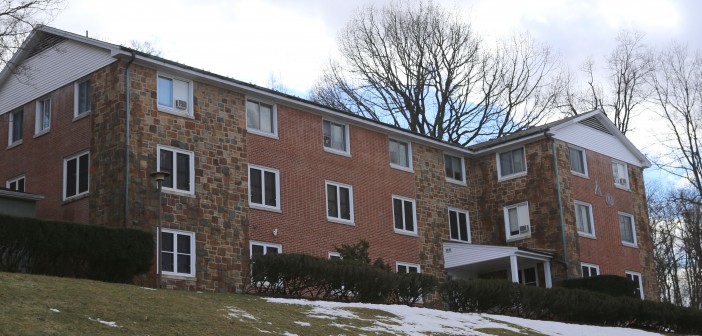Editor’s note: the names of the Delta Phi members mentioned in this story have been removed in order to protect them from possible national and administrative repercussions.
Delta Phi fraternity has taken steps to address uncertainties regarding the notebook of hazing rituals found in its house since being dissolved from Lehigh’s campus on February 21 until February 21, 2019, as a result of the notebook.
On Dec. 1, 2014, several brothers of Delta Phi were emailed and asked to meet with Lehigh officials to discuss a hazing allegation and investigation. The administration had obtained a notebook from 2011 that had been found specifically detailing Delta Phi’s hazing and pledging rituals. According to the Office of Fraternity and Sorority Affair’s Lehigh Greeks Blog, allegations included “coerced consumption of alcohol, line ups, servitude, and restrictions on sleep, contact, and behavior as well as degrading actions taken toward new members.”
Over winter break, the Delta Phi national headquarters hired an attorney to represent the fraternity in its conduct hearing and challenged Lehigh on the legality of seizing the notebook. According to a member of Delta Phi’s leadership committee, Lehigh officials claimed the notebook was taken in August when it was found on top of a heap of trash on the premises of the chapter house. The brothers of Delta Phi, however, said it had to have been taken over Thanksgiving break because multiple brothers had claimed to have seen the notebook throughout the first semester. Delta Phi was ultimately found guilty of several conduct violations and their appeal against the sanctions was rejected.
“Any student organization that is found responsible for violations of the code of conduct can appeal,” wrote Chris Mulvihill, the assistant dean of student conduct, in an email. “I wouldn’t say that groups appeal frequently, but when the consequences are very significant, appeals are often filed.”
He said that appeals can be filed for three reasons: If information that was not available at the time of the hearing is now available and this information can be reasonably expected to alter the outcome of the case; if the university disciplinary procedures were altered, and this may have affected the outcome of the case; or the sanctions are believed to be “unduly” harsh.
An organization can submit a letter to appeal and a response letter is then written by a member of the university committee on discipline or someone in Mulvihill’s office (in the case of a process appeal) addressing the points presented by the organization. A disciplinary appeal committee then meets and reviews the appeal.
“Appeals are sometimes granted, but not very often as the process is very fair and provides the organization with many opportunities to provide information to the hearing panel,” Mulvihill said.
Some Delta Phi members said they believe Lehigh’s conduct and appeals process was unfair and biased. A Delta Phi general member said that Lehigh’s code of conduct is not clearly written. Additionally, he disagreed with the way appeals are handled by the administration.
“I think it’s unfair that you can only appeal on three grounds,” the general member said. “And I think that you should get to appeal that the verdict is incorrect because pretty much the way it is now is that whatever the verdict is, is the verdict. There’s no way to avoid that. And you only get three days to appeal from the day of the trial, so I think that you should be able to have at least a week or so to appeal if you think that that is necessary.”
When sororities and fraternities enter the conduct and appeals process, these chapters also have the possibility of being disciplined by the Panhellenic and Interfraternity council, as well. Interfraternity Council President Ryan Newcomer said that what happens in terms of a fraternity’s representation in the council depends on the sanction. He also noted that judicial proceedings in the council are separate from student conduct cases.
“We have cases and Office of Student Conduct has cases,” Newcomer said. “The more cases we can handle ourselves, the better. Each board does (its) own things and we don’t usually get involved unless it were to somehow affect the greater community.” Delta Phi’s case was not handled by the Interfraternity Council.
The member of Delta Phi’s leadership committee added that the fraternity members were disgruntled over their appeal rejection because the national headquarters attempted to compromise with the committee. Instead of full chapter dissolution, the Delta Phi nationals were appealing to have two members of nationals restart the chapter at Lehigh, and have current members still be offered the status of early alumni.
“I think the general consensus among alumni was the plan to reform the chapter was of the best interest for the fraternity,” said Donald Beeson, the executive director of the Delta Phi national fraternity. “The fraternity and all of the alumni leadership we worked with were supportive of the plan that we put forward.”
Tim Wilkinson, the director of Fraternity and Sorority Affairs, said the Delta Phi nationals presented a plan of action to the university committee on discipline and that he cannot speak for the committee in their decision-making process.
“The rationale from the blog will tell you that the (university committee on discipline) did not feel a chapter that was involved in a (minimally) five year alumni/undergrad conspiracy to haze new members and purposely lie to and mislead the university, both by encouraging hazing, and lying about it, deserved a chance to recolonize,” he said.
Since there are now only 11 active chapters of Delta Phi, Beeson said nationals were advocating for Delta Phi to not lose recognition at Lehigh, and that he hopes Delta Phi will appeal to be reinstated in 2019.
The member of Delta Phi’s leadership committee said he thinks it was unfair for Lehigh to dissolve the fraternity over a notebook that was from 2011.
“They couldn’t prove that things had happened 100 percent,” he said. “The biggest problem I had was the evidence they used and the way it was attained, which wouldn’t hold up in legal court. That’s why no one has gotten into any legal trouble. It’s not something you can use in a legal court.”
The member of Delta Phi’s leadership committee also said that the Delta Phi chapter believes the evidence was taken illegally because Lehigh waited to start the investigation until December, when they claimed the notebook had been found in August, even though Delta Phi was still eligible to recruit new members in the fall.
However, according to Tim Wilkinson, the notebook was found by a facilities staff member in the facility and it was handed in to the Lehigh University Police Department, who then handed it over to the Office of Student Conduct.
“It is our obligation to investigate all information that is provided, hence the investigation in November and December,” Wilkinson said. “That investigation confirmed that the information in the book was true, and that the chapter lied during the March 2014 investigation stemming from anonymous hazing allegations.”
The notebook investigation began in the midst of Delta Phi being placed on disciplinary deferred dissolution, after an inappropriate text was sent out to 39 potential new members. The member who had sent out the text message was removed from his position as the fraternity member responsible for planning the recruitment of new members. After consulting alumni and nationals, a decision was made to disaffiliate the individual without offering early alumni status.
The member of Delta Phi’s leadership committee also said the fraternity thought their trial was unfair because Sharon Basso, the dean of students, who was the hearing officer regarding Delta Phi’s investigation on the inappropriate recruitment text message, was also assigned to be the hearing officer for the notebook trial. The president of Delta Phi wrote to Wilkinson, claiming Basso was biased, but Wilkinson kept Basso as the conduct officer.
The first case was heard and sanctioned by Basso because it involved a harassment charge. The university in August decided to make the change to have individual hearing officers hear cases involving harassment, according to Mulvihill.
Regarding the allegations, Basso said she was not involved in the hearing panel for the second case. Five individuals, comprised of faculty, staff and students, made up the panel, but she was not one of the panel members. She did conduct two interviews as part of the investigation surrounding the second conduct case, but that was because of the amount of interviews that needed to be conducted. At least four other administrators conducted interviews as part of the investigation process.
“(The conduct process) is not a one person process, it has checks and balances built in,” Basso said. “There were multiple investigators, and the hearing itself, has more than one person if it is a panel hearing, which has faculty, staff and students on it. Then if the case is appealed, there is a separate appeal panel that takes a look to see if it was fair. All of those layers apply to this case and it is difficult to apply bias to one person.”
In the appeal of the first case, the leadership of Delta Phi claimed that Basso was biased, but the appeals committee did not find bias in Basso’s decision.
The Delta Phi general member also agreed that the panel was biased for the hazing case.
“When it comes to disciplinary panels, you are allowed to challenge if one of the members is biased against a fraternity, but the other four members of the panel decide whether that person is biased or not,” the general member said. “We challenged one of the people on the panel because they were on the panel for one of the people in our chapter last year. The panel obviously said no.
“Pretty much in my opinion, it’s all formalities, but they can pretty much do whatever they want,” the general member said. “It’s like you versus the Court of Lehigh.”
Mulvihill said there was a member of the hearing panel that was involved in a prior conduct case regarding a member of Delta Phi, but it was several semesters ago and was not related to the recent charges. Because Delta Phi brought forth concerns of bias, the other four members of the hearing panel convened to discuss if there was bias, and they determined that was not the case.
“I was never on the panel and not present at the hearing, nor was I involved in the outcome in any way,” Basso wrote in an email. “Delta Phi also appealed this conduct decision and the university appeals committee denied their appeal, finding instead, that the outcome was a result of a fair and reasonable process.”
The now-alumni members of Delta Phi can live in the Delta Phi house on “the Hill” through the end of this spring, but will be required to move elsewhere next semester. Next academic year, either Phi Delta Theta fraternity or Delta Chi fraternity will move into Delta Phi’s house.
“I think it’s important for everyone in the community to realize that hazing and the pledging process is something that is counterproductive for any organization, not just Greek,” Beeson said. “I would like to see students ban together across all organizations to stop hazing. It has no place in any organization on any college campus.”






Comment policy
Comments posted to The Brown and White website are reviewed by a moderator before being approved. Incendiary speech or harassing language, including comments targeted at individuals, may be deemed unacceptable and not published. Spam and other soliciting will also be declined.
The Brown and White also reserves the right to not publish entirely anonymous comments.
1 Comment
Has Lehigh expelled the hazers?